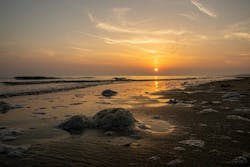Lake Hopatcong has remained closed due to a record-setting algae bloom that also has affected other New Jersey lakes this summer, according to NJ Spotlight.
The algae blooms stem from this summer’s high temperatures and heavy rainfall, which have washed fertilizers and nutrients into lakes from storm water sewer and combined sewer systems. The U.S. EPA estimates upgrading the sewer systems could cost around $16 billion, and upgrading the drinking water system could cost $8 billion. Also, it would cost more than $9 billion to address combined sewer overflows that also plague the state, according to NJ Spotlight.
According to NJ Spotlight, Dan Kennedy, director of environmental and utility operation at the Utility & Transportation Contractors Assn., said those estimates indicate larger problem with New Jersey’s overall water infrastructure condition.
“Lake Hopatcong is just another micro-emergency,’’ said Kennedy, according to NJ Spotlight. “We are bouncing from one issue to the next.’’
New Jersey loses an estimated 130 million gal of drinking water every day before the water reaches customers. According to NJ Spotlight, more than 200 combined-sewer outfalls dump untreated sewage into New Jersey waters during heavy rainfall.
Earlier this year the New Jersey Department of Environmental Protection Commissioner Catherine McCabe also estimated the cost of replacing all lead-service lines in the state could cost up to $2.3 billion.
